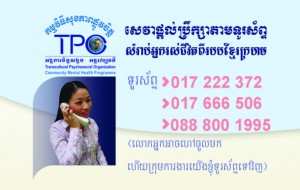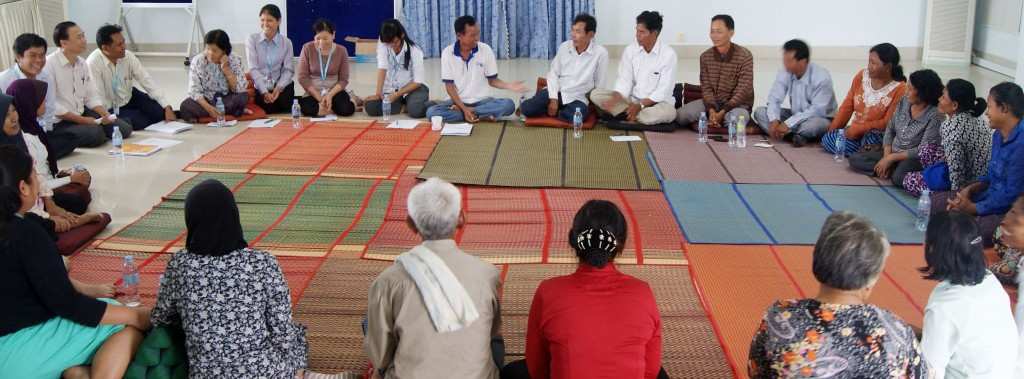Justice & Relief for Survivors of the Khmer Rouge
Background
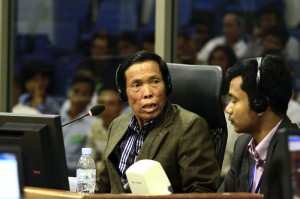
A TPO Counselor (right) provides psychological support to a civil party and Khmer Rouge survivor during legal proceedings at the ECCC.
In a society where so many Cambodians continue to struggle with the aftermath of their country’s violent history, facing the past is crucial to recovery from mass atrocity. The Extraordinary Chambers in the Courts of Cambodia (ECCC) offer a unique opportunity for survivors of the Khmer Rouge to seek truth and justice. For the first time in an international criminal tribunal, survivors of mass atrocities have been included in the trial process as civil parties, rather than as simple witnesses, permitting them to play a more active role in the legal proceedings with full procedural rights. This active participation in a court can have a highly empowering impact on survivors of mass atrocities. The court provides them with enhanced opportunities for healing. It gives the survivors the space to recount and receive some acknowledgment for the past abuses suffered.
However, the involvement of survivors in criminal proceedings also carries the risk of adversely affecting the psychological well-being of survivors. TPO also believes that trauma recovery and reconciliation are long-term processes that require more than just retributive justice and should be carried out in tandem with psychological support services and social reconstruction efforts. This is why we are running our comprehensive psychosocial ‘Justice and Relief for Survivors of the Khmer Rouge’ program.
The Goals
With this program, we support witnesses and civil parties during the proceedings at the Extraordinary Chambers in the Courts of Cambodia (ECCC), also known as the “Khmer Rouge Tribunal”. Working in close cooperation with the Witness and Expert Support Unit (WESU) and the Victims Support Services (VSS) of the ECCC, we provide a variety of psychosocial services through our Cambodian mental health experts. These range from on-site psychological support before, during and after the ECCC proceedings, and trauma treatment, to community-based truth-telling and memorialization initiatives. Our project activities also aim to raise awareness of trauma, torture and mental health issues with the wider Cambodian population.
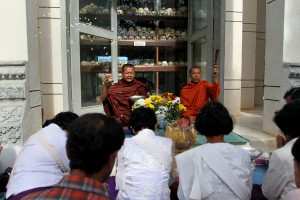
With this project we aim to help trauma survivors of the Khmer Rouge regime, as well as their families and communities.
Target Groups
PRIMARY BENEFICIARIES: civil parties in Case 002 at the ECCC, all of them survivors of trauma from the Khmer Rouge regime
SECONDARY BENEFICIARIES: the families and communities of the civil parties and Cambodian society in general
Our Initiatives
On-Site Psychological Support during ECCC Legal Proceedings
TPO counselors provide on-site psychological support services for witnesses and civil parties at the ECCC. They help them reduce anticipatory anxiety through psychological briefing before the proceedings, monitor their emotional state and offer psychological support during the trial, and do debriefings with them after the proceedings.
Psychological Services at the TPO Treatment Center
Services at the TPO Treatment Center in Phnom Penh include supportive psychotherapy and counseling services by trained psychiatrists as well as psychiatric consultations and medical treatment if required.
Testimonial Therapy – Culturally Adapted Trauma Treatment
Testimonial Therapy is a internationally recognized, pragmatic trauma treatment method that was specifically developed for the treatment of post-traumatic stress resulting from organized violence. It was first described by Lira and Weinstein in Chile and has since been tested in different socio‐cultural settings. TPO has been adapting this testimonial method by integrating traditional and religious practices in cooperation with local pagodas and Buddhist monks, reflecting the significance of traditional coping mechanisms in Cambodia’s spirit‐based culture. In testimonial therapy as applied by TPO, civil parties, all trauma survivors of the Khmer Rouge, are invited to talk about their traumatic experiences. With a counselor they restore their painful memories and convert them into a written testimony, which, in turn, is read aloud and delivered to the survivors by monks from a local pagoda in a Buddhist ceremony (or equivalent person in the local mosque, church, or temple depending on the client’s religious orientation) in presence of other survivors, relatives, community members, local authorities, government officials, NGO representatives, youth and others. This promotes the acknowledgement of suffering, the de‐stigmatization of survivors and restores their dignity. It also allows the survivors to ease the suffering of the spirits of ancestors and pay respect to deceased relatives.
Phone Counseling
TPO’s phone counseling hotline is open to all Khmer Rouge survivors and their families and can be reached from 8am to 4pm during working days.
Victim–Former Khmer Rouge Dialogue
The Victim–Former Khmer Rouge Dialogue Pilot Project, a collaboration project between TPO and Kdei Karuna (www.kdei-karuna.org/program/vfkr/), aims to rebuild and understand the fragmented relationship between victims and their direct perpetrators. While calls have been made for reconciliation from the Cambodian government, victims themselves often wish to receive acknowledgement and an apology from their direct perpetrators. For perpetrators, overcoming cultural obstacles that hinder even the acknowledgement of crimes make an apology difficult to achieve. With the fundamental belief that a grassroots participatory approach is necessary to achieve this, TPO and the ‘International Center for Conciliation’ (ICfC) encourage project participants to define their needs, expectations, and roles within the process of this dialogue to fully engage them and their communities in addressing local needs for justice and healing. These activities have concluded and you can read our report ‘Victim – Former Khmer Rouge Dialogue Project’ to learn more about this. See more about this report at TPO Publications.
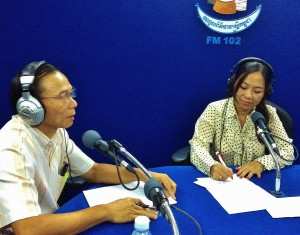
TPO’s call-in radio show is the perfect medium to reach a wide local audience with information about trauma incurred during the Khmer Rouge, its ongoing impact, what can be done about it and the proceedings at the ECCC.
Radio Broadcasts
The project’s radio call-in-show aims to inform people about trauma and related psychological symptoms, which might resurface when remembering past events. Listeners learn about possible coping strategies, share experiences and express concerns and questions related to mental health. The radio show “Past in the Present” is hosted by an experienced TPO Counselor involved in the project and conducted monthly on Friday from 3-4 pm on FM 102 MHz and re-broadcast several times a month.
Mental Health Training
TPO provides training courses and workshops for staff of the ECCC and non-governmental organizations. Participants learn about trauma, its after-effects and how they can reduce the psychological burden during legal procedures. Coping and self-care strategies help legal staff deal with emotional reactions and feelings of helplessness during the course of their work.
Truth-Telling & Memorialization Initiatives
TPO advocates for and collaborates with local partners in truth-telling and memorialization activities as key components of the Cambodian transitional justice process. In cooperation with the Khmer Institute of Democracy (KID) and the International Centre for Conciliation (ICfC), TPO has completed the participatory film project “We Want (u) to Know”. Created via a participatory approach, Khmer Rouge survivors and their descendants designed, filmed and directed this documentary to share their stories with audiences around Cambodia and the world. More information on the film can be found here: http://www.we-want-u-to-know.com or http://www.facebook.com/wwu2k
The project also documents and publishes personal narratives of Khmer Rouge survivors. These stories capture the pain, strength and dignity of individuals who survived Cambodia’s genocidal years.
Two such initiatives are our publications “IWitness: Voices from Survivors of the Khmer Rouge” and “My Testimony – Life Stories of Cambodian Survivors of the Khmer Rouge regime”, which can be obtained by emailing admin@tpocambodia.org. More information on these book can be found on this website at TPO Publications.
You can also read some of these Life Stories of Survivors of the Khmer Rouge on this website here.
Donors & Project Partners
DONORS:
GIZ (German Society for International Cooperation)
http://giz-cambodia.com/
Swiss Foundation
United Nations Voluntary Fund for Victims of Torture (UNVFVT)
http://www.ohchr.org/EN/Issues/Torture/UNVFT/Pages/WhattheFundis.aspx
Australian Embassy (via the Direct Aid Program of the Australian Department of Foreign Affairs and Trade).
http://dfat.gov.au/aid/topics/development-issues/direct-aid-program/Pages/direct-aid-program.aspx
PROJECT PARTNERS:
Witness and Expert Support Unit (WESU) and Victims Support Section (VSS) at the Extraordinary Chambers in the Courts of Cambodia (ECCC).
For more info, please contact
Mr Pich Panha, Project Coordinator at TPO, on pichpanha@tpocambodia.org

